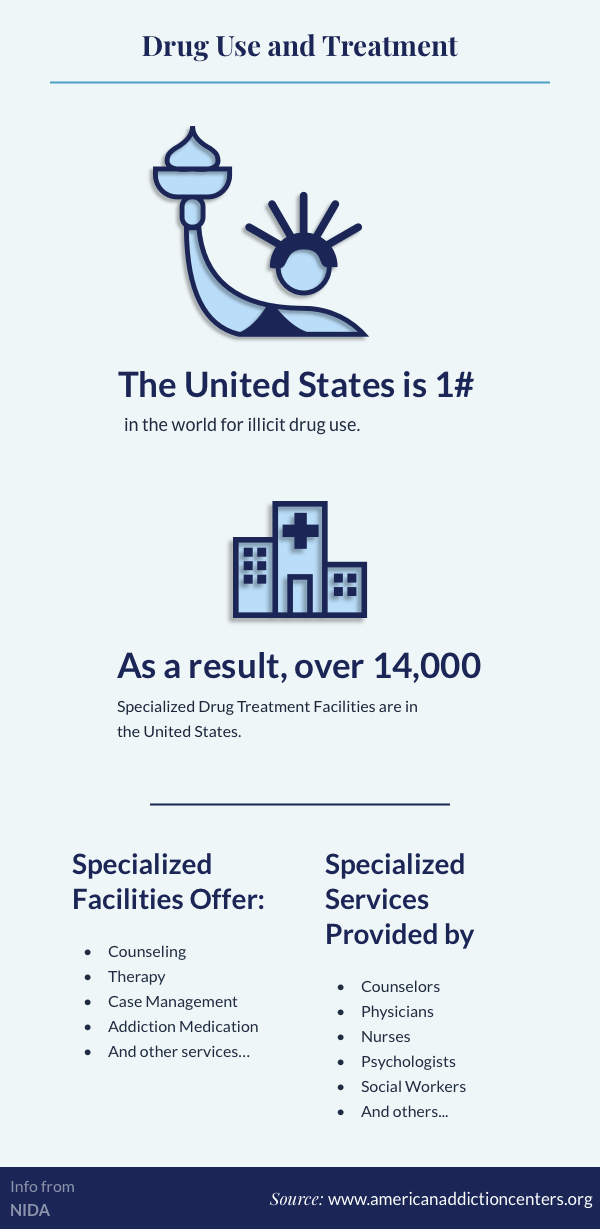All About Drug Rehabilitation
Table of ContentsThe Single Strategy To Use For Drug RehabilitationThe 5-Second Trick For Drug RehabilitationThings about Drug RehabilitationThe Greatest Guide To Drug RehabilitationThe Best Strategy To Use For Drug Rehabilitation
This entails dealing with the entire person to ensure that all of the underlying domino effects of the dependency are effectively cared for and corrected. This offers individuals the tools they need for a full return to a satisfied, healthy and balanced, substance-free life. Medicine dependency "therapy" is a little bit of a deceptive term it implies that individuals with addictions are "all far better" after they have gotten some form of treatment.Even people with years of successful recuperation should remain mindful of their capacity for relapse, and they should use the devices they found out in treatment to avoid it. Words "rehabilitation" also implies that someone is being corrected after being mischievous, which follows culture's preconception concerning addiction. Drug Rehabilitation. Component of the healing procedure is for individuals with addictions, and their households, to learn that dependency is an issue of biology and not morality
Transitioning from physical and psychological addiction to a healthy and balanced and happy way of living is a huge modification. It is essential that the actions to medicine recovery be correctly attended to throughout the medicine rehab process. There are four stages of dependency healing: Addiction analysis is a specifically crucial component of the rehabilitation process.
This is part of the underlying psychology of addiction, and it strengthened by anxieties of apprehension for possession and judgment from friends and family. The analysis process needs getting trust and appearing that secretive nature. The private requirements to determine which materials were utilized and the level of their substance use.
Our Drug Rehabilitation Ideas
For many individuals with addictions, anxiety of withdrawal is a major barrier to escaping their addiction, and that concern keeps them from even trying. Withdrawal and medication detoxification do not have to be a dreadful experience.
This is where the underlying root causes of addiction are addressed. For most individuals with click this link substance addiction, their compound use is no more about getting high. Rather, it became a repetitive, day-to-day procedure of avoiding withdrawal symptoms and running away from their truth. Drug rehab is the procedure where the deep concerns around the dependency are determined and addressed.
An Unbiased View of Drug Rehabilitation
Rather, it can be stated that rehabilitation is the process of discovery, while what takes place afterward is recovery. The addicted mind often starts to believe especially after an amount of time in abstaining that it is okay to attempt drinking or making use of compounds once more. Nevertheless, this seldom functions, and the large majority of people who try alcohol consumption or making use of drugs once more will rapidly finish up where they were previously.

Sober living residences are an especially efficient technique to aftercare when an individual is discharged from rehabilitation. People and their households should talk about these choices with Full Article their counselors while still in rehabilitation. There are different kinds of treatment for addiction, based upon the degree of care provided. When picking the level of therapy, the choice must be based on what will certainly use the private the most effective possibility of success in recuperation out what the individual wishes to do.
This is a poor mix, as it thrusts many people to believe that they can quit making use of drugs or alcohol consumption on their very own. They might be hesitant to see and confess that they require a higher level of treatment, such as inpatient rehabilitation. Detoxification from a substance is not the same as therapy for material addiction.
Some Known Incorrect Statements About Drug Rehabilitation
, people's minds are muddled and they really feel physically and mentally unwell. They are not receptive to any kind of therapy or treatment up until their minds clear and they are feeling click reference much better.
Like inpatient therapy, residential treatment supplies the therapeutic effect of eliminating individuals from their inefficient lifestyle and environment and placing them in secure, healthy and balanced environments. This enables them to reorient their lives and believed processes while concentrating on distraction-free healing.
Individuals receive therapeutic solutions on-site throughout the day, however go home or to a sober living facility at evening. The strength of the daytime therapy will certainly depend on individual needs and the programs offered at the outpatient facility. The majority of individuals with severe dependency will likely have far better outcomes in inpatient therapy and rehabilitation.
Drug Rehabilitation for Dummies
Lasting property treatment programs often use a healing method referred to as the healing area (TC). This is an approach to re-socializing individuals whose addiction has actually seriously affected their capability to fit into society. These include people with significant criminal habits, individuals that are homeless, teens and individuals with severe psychological health disorders.